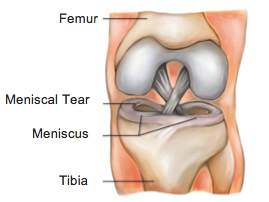
Meniscal Tears
The knees take a lot of impact when doing medium- or high-impact activities such as running, jumping, hill-walking and playing field sports. The meniscus is commonly damaged during these activities, and can be a cause of significant pain and movement dysfunction if damaged. What exactly is this mysterious meniscus, and why is it so important?
What is the role of the meniscus?
The meniscus is a thin, fibrous cartilage lining the bones of the knee. Its main function is to absorb shock when performing weight-bearing activities such as walking, running or hopping.
The meniscus in the knee is c-shaped, and there is one on the outside (lateral) and one on the inside (medial) knee joint. The medial meniscus is more commonly damaged than the lateral meniscus, because of the fact that more weight is transferred through the medial knee joint in normal movement.
What causes meniscal damage?
Twisting forces most frequently damage the meniscus. For example, if a soccer player’s foot is planted on the ground and their body rotates around the knee, the meniscus will often be unable to withstand the pressure and will sustain a strain or a tear. This can be of varying degrees, to a few stretched fibres right up to a large tear involving multiple areas of the cartilage. A locking, clicking or clunking may be felt in the knee upon movement. Your physiotherapist will be able to perform clinical tests to check whether the meniscus is likely to have been damaged or not.
Can I recover from a meniscal injury?
Depending on the extent and location of the injury, many patients have excellent functional outcomes with physiotherapy management. This typically involves strengthening the muscles around the knee as well as increasing the range and training task-specific activities. Sometimes, a referral to an orthopaedic doctor can help to determine whether or not surgery may be appropriate. If you have any doubts, talk to your physiotherapist about your options.
None of the information in this newsletter is a replacement for proper medical advice. Always see a medical professional for advice on your individual injury.
Please click the download button below to print out a free copy of our newsletter.
Physio Direct is ACC accredited so you can come to us directly to get an injury registered with ACC without having to go to your GP first, followed by an assessment, treatment and follow up review, to ensure correct care and recovery. Physio Direct can also refer you directly for Cortisone injections, X-Rays and Ultra Sound Scans and on to Specialists if needed.
Please feel free to print out these news letters and put the in the staffroom and hand them out to your team. Understanding more about injuries, gives people the power to prevent an injury from occurring in the first place. Prevention and education is the key!
